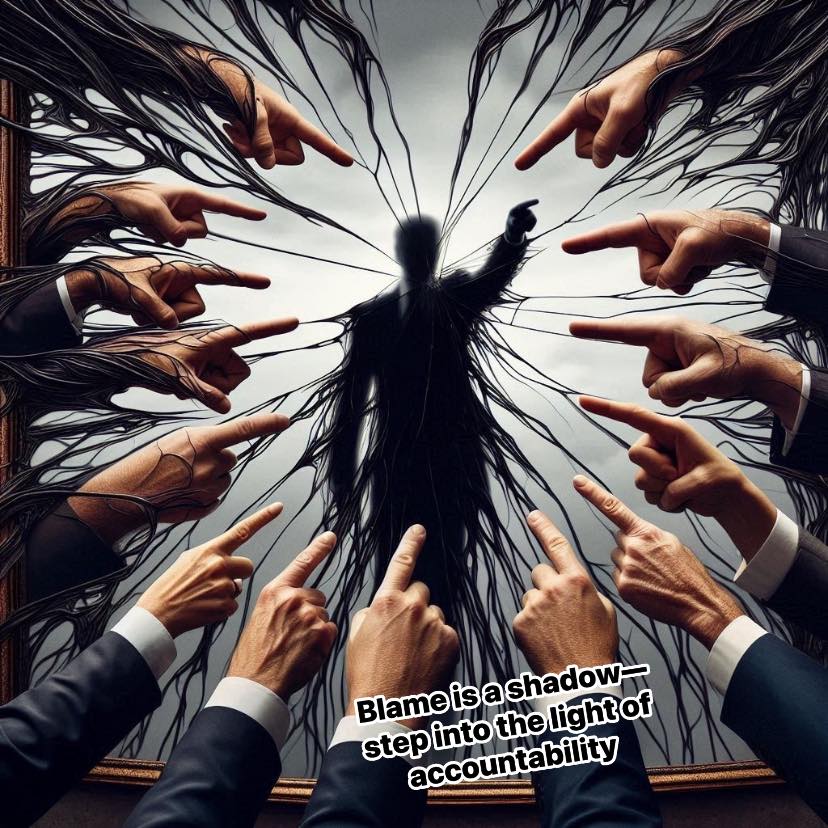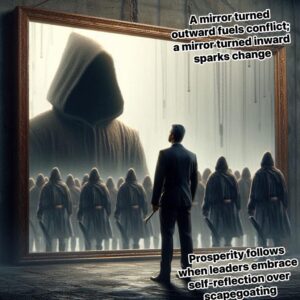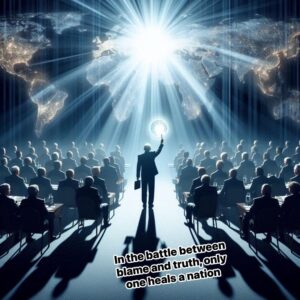
The grand chamber of the Global Summit echoed with impassioned voices. Leaders from across the world sat around an opulent, circular table, their faces painted with practiced expressions of diplomacy, concern, and, beneath it all, quiet resentment. It was the day of the annual “State of the World” address—a moment where nations reflected on their economic struggles, conflicts, and failures. But, as history had proven time and again, reflection was rarely on the agenda.
One by one, the leaders spoke.
“The downturn in our economy is a direct result of foreign interference,” declared a statesman, slamming his palm on the table. “Their aggressive trade policies have drained our industries!”
A neighboring leader nodded in agreement. “Our people are suffering, not because of our own shortcomings, but because of external sabotage.”
Across the room, another official leaned forward. “We have been forced into conflict. If it weren’t for them, our people would know peace.”
The chorus of accusations swelled, each nation weaving a tapestry of grievances, each statement casting a shadow over some distant “other.” The atmosphere became heavy, thick with self-righteous justification. And then, amidst the storm of rhetoric, an elder stateswoman—a figure of wisdom long ignored—rose from her seat.
She did not raise her voice. Instead, she simply lifted a mirror.
The leaders fell silent, their reflections staring back at them—wrinkled with stress, eyes hardened by years of deflection.
“This mirror,” she said, her voice calm yet unyielding, “has witnessed history unfold. It has seen rulers rise and fall, nations prosper and decay. And in every era, one pattern remains unchanged: when failure looms, the hand of blame extends outward, never inward.”
The room shifted uneasily.
“Blame is a shadow, cast by those who fear their own shortcomings. It is easy to claim that foreign powers have crippled our economies. But did we not let corruption fester within our own walls? Did we not ignore the plight of our workers while feeding the greed of a few?”
A hush fell over the room.
“It is convenient to say that war was forced upon us, that conflict is always the making of another. But did we not let our hatred be cultivated, our people manipulated into believing that division is survival? Have we truly exhausted the paths of dialogue before sharpening the knives of war?”
One of the younger leaders, who had moments ago pointed fingers with conviction, now averted his gaze.
“The truth,” she continued, “is that responsibility is like sunlight—it exposes both our triumphs and our failures. Yet, we choose to stand in the shade, shielded by excuses, while our nations wither in darkness.”
She lowered the mirror and looked at them, not as enemies or rivals, but as fellow stewards of humanity’s future.
“There is only one path forward—the path of accountability. Will we step into the light, or remain in the comfortable shadow of blame?”
Silence filled the room, but this was no longer the silence of denial—it was the hush of a world standing at the edge of realization. For the truth remained: a mirror turned away reveals nothing, but when faced directly, even the deepest flaws come into the light, offering a chance for change.



